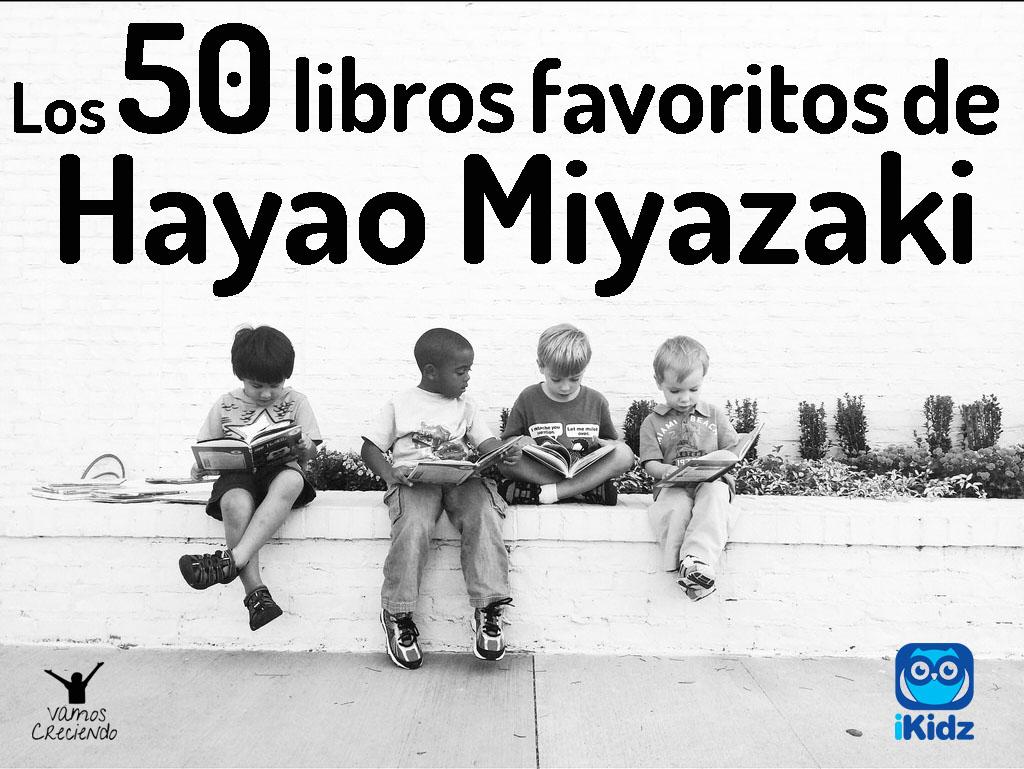Cuando un niño de 11 años pregunta a uno de los ilustradores más famosos del mundo qué tipo de libros leía cuando tenía su edad, sabe que se expone a una lista de tesoros interminable.
Esto ha sucedido con Hayao Miyazaki. Quizá muchos no le conozcáis, pero aquellos interesados en el manga y la ilustración sabréis que es uno de los ilustradores más venerados.
Os dejo un trocito de una de sus entrevistas y una lista con sus 50 libros favoritos. Estoy segura que entre estos, encontraréis grandes joyas para hacer vuestro verano y el de vuestros hijos, mucho más llevadero. Por supuesto los libros son en inglés ¡A practicar!
Alice’s Adventures in Wonderland by Lewis Carroll
A Norwegian Farm by Marie Hamsun
A Wizard of Earthsea by Ursula K. Le Guin
Children of Noisy Village by Astrid Lindgren
City Neighbor, The Story of Jane Addams by Clara Ingram Judson
Eagle of The Ninth by Rosemary Sutcliff
From the Mixed-Up Files of Mrs. Basil E. Frankweiler by E. L. Konigsburg
Hans Brinker, or The Silver Skates by Mary Mapes Dodge
Heidi by Johanna Spyri
Ivan the Fool by Leo Tolstoy
Journey to the West by Wu Cheng’en
Les Princes du Vent by Michel-Aime Baudouy
Little Lord Fauntleroy by Frances Hodgson Burnett
Nihon Ryōiki by Kyokai
Nine Fairy Tales: And One More Thrown in For Good Measure by Karel Čapek
Robinson Crusoe by Daniel Defoe
Souvenirs entomologiques by Jean Henri Fabre
Strange Stories from a Chinese Studio by Pu Songling
Swallows and Amazons by Arthur Ransome
The Borrowers by Mary Norton
The Little Prince by Antoine de Saint-Exupér
The Flying Classroom by Erich Kästner
There Were Five of Us by Karel Poláček
The secreat Garden by Frances Hodgson Burnett
The Treasure of the Nibelungs by Gustav Schalk
The Three Musketeers by Alexandre Dumas
The Flambards Series by K. M. Peyton
The Long Winter by Laura Ingalls Wilder
The Adventures of Tom Sawyer by Mark Twain
Tistou of the Green Thumbs by Maurice Druon
The Adventures of Sherlock Holmes by Arthur Conan Doyle
The Otterbury Incident by Cecil Day-Lewis
The Little Bookroom by Eleanor Farjeon
Twelve Months by Samuil Yakovlevich Marshak
The Restaurant of Many Orders by Kenji Miyazawa
The Man Who Has Planted Welsh Onions by Kim So-un. Por más que he buscado sobre este libro, no he conseguido encontrar nada, en cualquier caso, lo dejo porque forma parte de la lista de 50 libros que recomienda este ilustrador.
The hobbit by J. R. R. Tolkien
Twenty Thousand Leagues Under the Sea by Jules Verne
The Adventures of the Little Onion by Gianni Rodari
Treasure Island by Robert Louis Stevenson
The Ship that Flew by Hilda Winifred Lewis
The Wind in the Willows by Kenneth Grahame
The Little Humpbacked Horse by Pyotr Pavlovich Yershov
The Little White Horse by Elizabeth Goudge
The Rose and the Ring by William Makepeace Thackeray
The Radium Woman by Eleanor Doorly
The Voyages of Doctor Dolittle by Hugh Lofting
What the Neighbours Did, and Other Stories by Ann Philippa Pearce
When Marnie Was There by Joan G. Robinson
Winnie-the-Pooh by A. A. Milne
Con este post me despido hasta septiembre. Hacemos un parón en el blog para recargar pilas y preparar muchas cosas de cara al próximo curso.
Gracias por estar ahí.
¡Feliz verano!
“La lectura de un buen libro es un diálogo incesante en que el libro habla y el alma contesta”.
André Maurois
.


